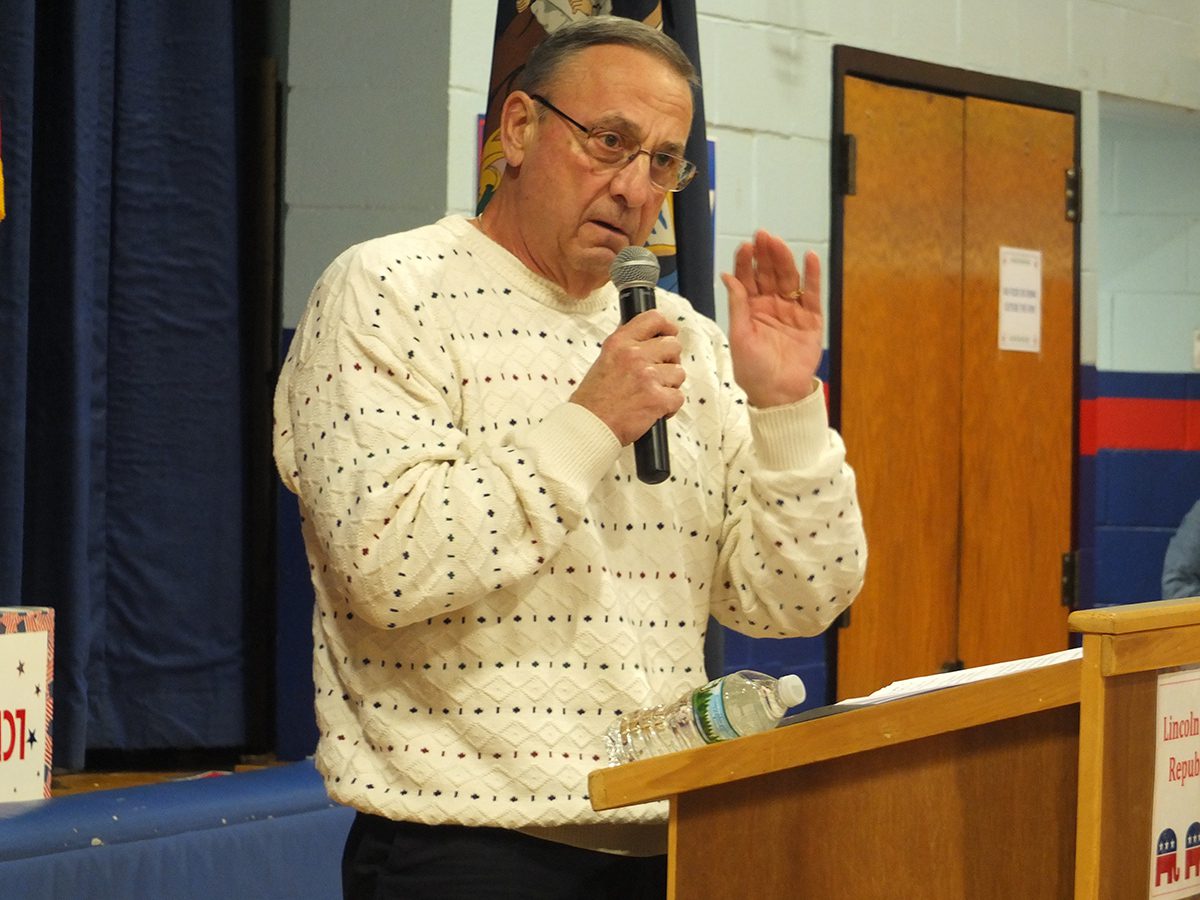No matter what your opinion of Paul LePage is, it’s safe to say that his two terms as governor have added up to a contentious tenure.
As Attorney General Janet Mills gets set to be Maine’s first female governor, Pine Tree Watch examines LePage’s run.
What did eight years with a first-wave Tea Party Republican, from the get-go garnering embarrassing headlines, do for Maine’s long-earned political reputation as a peaceful, practical-minded and independent state?
Time and perspective will bring the larger picture into focus, but right now LePage’s unique brand of governing – and its impact on Maine’s people, policies, political mood, economy, environment, services, healthcare and businesses – has meant very different things to many different people.
What did he do right? What did he make worse? And where do we go from here?
Unnecessary turbulence
“It’s a legacy of missed opportunities,” contends outgoing Sen. Roger Katz (R-Augusta), whose time in the upper chamber coincided with the governor’s tenure, and who has known LePage for more than a decade, since both were Central Maine mayors.
“During his eight years, the Republicans were in complete control for the first two, and in control of the Senate for three out of the four terms,” Katz says. “The governor is to be congratulated for putting Maine’s fiscal house in order, and that is part of his legacy. But we could have accomplished so much more.
“And I think the reason we didn’t is that the governor was unable or unwilling to sit down with well-meaning people in both parties and listen and compromise and try to get to middle ground,” he adds. “For all of his skills, being a good listener is not one of them. Far too often, rather than trying to get people in a room together, it was a message of us versus them.”
The tone of his administration was set even before LePage – who declined to be interviewed for this story – was elected.
“As your governor, you’re gonna be seeing a lot of me on the front page saying ‘Gov. LePage tells Obama to go to hell,’ ” LePage said during his campaign, one of the first of many times his words would make headlines around the world.
Just days after taking office, he turned his ire toward his own constituents. “Tell them to kiss my butt,” he said in response to the Maine NAACP’s complaints about his decision not to attend its Martin Luther King Jr. Day ceremonies in January 2011.
His attacks against his political opponents, in Augusta and beyond, would only get more frequent, personal, controversial and off-color in the years ahead.
For all of his skills, being a good listener is not one of them. Far too often, rather than trying to get people in a room together, it was a message of us versus them.”
— Sen. Roger Katz, R-Augusta
LePage has made politics “personal and nasty in Maine as it never before has been,” contends Sandy Maisel, chair of the political science department at Colby College. “This has impacted the Legislature – where his followers have divided the Republicans and thwarted most efforts at bipartisanship – the judiciary, the state bureaucracy, and even our relationships in Washington. It surely has had an effect on what businesses think of Maine as place to move employees.”
As Portland Press Herald columnist Bill Nemitz sees it, LePage “will be remembered as the governor who presided over an unnecessarily turbulent period in Maine history. And in doing so, he didn’t just shortchange the whole state but shortchanged himself. I think he could have gotten a lot more accomplished if he had just kept his emotions in check.”
Even LePage’s ideological allies somewhat agree with that assertion.
“Most of my criticisms of LePage’s tenure relate to things that I think could have been accomplished if he had chosen a different strategy, or behaved differently,” says Matt Gagnon, CEO of the Maine Heritage Policy Center, a conservative think tank.
“His candor and pugnacious personality have tremendous positives for his governorship, and indeed I think his relentless combativeness has resulted in him succeeding in some very difficult areas,” Gagnon explains. “However, it has also caused some of his reforms to be dismissed and ignored when I don’t think they should have been.”
Trump before Trump?
Those indignant “61%” bumper stickers, slapped on the muddy Subarus of lefter-leaning portions of our state are not as prevalent as they were in the first four years of his term, but as he leaves the Blaine House, it’s worth noting that LePage’s approval rating (40 percent, according to a fall 2018 report from Portland polling firm Critical Insights) is largely similar to his vote percentage from 2010 and 2014, having held largely intact over eight years.
If that steady 40ish percent reminds you of the polling numbers of the current president of the United States, it might not be a coincidence. Donald Trump, after all, is someone to whom the governor is often compared – and to whom he has compared himself.
“I was Donald Trump before Donald Trump became popular,” LePage said proudly when he became an early Trump endorser in 2016.
When LePage announced on November 5, to the surprise of very few, that he’d be moving to income-tax-free Florida as soon as his term was up, it made more national headlines, and was briefly trending on Twitter.
“The Trumpiest politician in America does the Trumpiest thing on the way out,” was how NBC News political reporter Benjy Sarlin saw it.
“Many claim to be Trump Before Trump,” Sarlin explained, “but it’s hard to top LePage’s combo of governance by owning libs, racist provocation and winning (twice!) with weak approval and plurality support thanks to third-party defection and GOP waves.”
LePage had a more grounded agenda. And I think he’s a more practical person than Trump – that’s not to say he’s practical, but he’s more practical than Trump.”
— Al Diamon, longtime Maine political columnist
LePage has been making national headlines since nearly the moment he was elected in 2010 – years before Trump became the focal point of world politics. But LePage has never tired of comparing himself to his more (in)famous national counterpart.
“The governor is fond of saying he was Donald Trump before Donald Trump, and I think that’s an apt observation,” notes Katz.
Certainly the hallmarks are all there: business background, combative personality, knack for playing to the base, and too-many-to-count front-page stories about inflammatory public statements.
But look closer and there are differences between the president and the governor, says longtime Maine political columnist Al Diamon.
“Paul LePage came in with a very firm agenda that he wanted to get done – and it wasn’t an agenda he had crafted to get elected, I think he genuinely believes in the stuff he promotes,” Diamon says. “I don’t think that’s true with Trump. Trump is just an attention-getter. Other than being rude in public, they’re not very similar.”
Ideologically, “there’s less overlap than you might think,” he explains. “On issues such as Canadian trade, for instance, LePage had a more grounded agenda. And I think he’s a more practical person than Trump – that’s not to say he’s practical, but he’s more practical than Trump.”
Nemitz agrees: “There are significant differences. I think LePage is probably more strategic than Trump, believe it or not. And I think he has more self-awareness about what he does and how he does it and why he does it. Whereas Trump is just one reaction after another.”
Still, he adds, “I think there are definite similarities in their personalities, such as narcissism, and thinking they’re the only ones who matter.”
Or, for instance – much like Trump’s well-documented lack of curiosity about large swathes of federal policy, with LePage “there are areas of state government that he really doesn’t know anything about,” says Diamon, pointing to education and environmental regulation to name two.
But again, the political gifts both share transcend policy, he says, and demonstrate a strong connection with their staunchest supporters. “The thing LePage has – and we can borrow a Trump comparison here again – is his message is clear. And it appeals to the people who vote for him. It doesn’t matter that it doesn’t make any sense.”
Personality and politics
Many of LePage’s most combative traits find their roots in his hardscrabble upbringing in Lewiston, and his dogged determination to rise from crushing poverty and domestic violence to make something of himself in business.
“Anything he got, he was going to have to fight for it,” says Nemitz. “He rose up from some pretty dire circumstances. He’s always been a scrapper. But I think the transition from business to politics was a difficult one for him. When he came to Augusta, I think he was at first bewildered and then increasingly angered by the fact that not everybody was prepared to jump when he ordered them to.”
It seems that so much of the controversy and challenges of the past eight years have stemmed not necessarily from LePage’s politics, but his combative personality.
“If you fairly assess Paul LePage, you’ve got to set aside ideology and look at competence – and that’s where he falls short,” Diamon says, echoing the words of his fellow columnist. “He came from a business background, and when he said jump, everyone said, ‘How high?’
“It just isn’t like that in politics and he’s never been able to accept that. He attacked people right from the start. He got personal. He wouldn’t compromise at all, even on minor points. He’d get bills passed that were 75-80 percent what he wanted and he’d veto the bill anyway.”
Much of what the governor set out to do when he got to Augusta made perfect sense, says Diamon: “Get the state budget under control, pay off the Medicaid debt to the hospitals and lower taxes, particularly income tax. Those are things rational people can disagree on, but they’re not irrational ideas. The problem for LePage is he went after them in ways that – even when he accomplished what he set out to do – made it harder for him.”
Katz has similar feelings.
“My first experience with him was when we were both mayors – him of Waterville and me of Augusta, at a conference in Quebec,” he says. “He was a great guy to drink a beer with, that’s for sure. But I don’t know why, rather than try to find common ground, he chose to try to characterize the Legislature as a whole as the enemy.”
LePage’s brand of politics, the “personal attack and name-calling,” Katz says, is “not consistent with collaboration at all. Whether it’s tax reform, or further welfare reform, or education reform, there was a lot left on the table because of his style of us vs. them. I wish it weren’t so.”
Legislative jousting
The rough-and-tumble relationship between LePage and Democrats in the Maine Legislature was one of the more consistently contentious themes of the past eight years – and is one area that looks poised for a quick and dramatic turnaround, as Democrat Mills will enter the office with friendly majorities in both chambers.

LePage’s battles with the Maine House and Senate often were epic. It’s one major difference between him and Trump – even legislators from his party were willing to push back against him and serve as a check on some of his more extreme impulses – on the Senate side, at least. He found more willing cooperation in the House.
“LePage is lucky that the House Republican caucus bought into his bluster and has stood by him, even when it was not in their best interest,” says Diamon.
“You’ve got some very conservative Republicans in the Senate, and they don’t want anything to do with LePage because they know he’s not going to work to get anything done. And there were things they wanted to get done. Like half the state budget, and other weird stuff like that.”
“On Capitol Hill, you have to really look long and hard to find a Republican who hasn’t at one time or another enabled Trump, if not by action then by inaction,” says Nemitz. “That group in Augusta can be distilled down to the House minority Republicans. Whenever LePage has won, it’s always the House Republicans who had just enough votes to make the veto stick.”
But if LePage has faced more legislative resistance than Trump has, “he’s also been able to exert his will,” contends Nemitz. “At some point somebody has to go back and count them, but the number of [vetoes] – I’m sure he’s vetoed more bills in eight years than all Maine governors combined.” (Editor’s Note: Not quite all governors combined, but all for the past 100-plus years.)
Combative, counterproductive
Right until the very end, LePage’s stormy war of words with lawmakers was a major theme of his tenure.
For instance, he called well-liked Republican Sen. Tom Saviello the “most repugnant human being” over a disagreement about lumber tariffs. (He later promised to apologize when “hell freezes over.)
Katz, Saviello’s friend and Senate colleague, called the incident “exhibit A of his approach to the Legislature. He came in and was very much of an antagonist, and personally attacked one of our members for no good reason. I think it was kind of emblematic.”
On Capitol Hill, you have to really look long and hard to find a Republican who hasn’t at one time or another enabled Trump, if not by action then by inaction. That group in Augusta can be distilled down to the House minority Republicans. Whenever LePage has won, it’s always the House Republicans who had just enough votes to make the veto stick.”
— Bill Nemitz, columnist for the Portland Press Herald/Maine Sunday Telegram
“Those kinds of things are what I’ll always remember about Paul LePage, more than the offhand stupid comments,” says Diamon. “He thinks he’s the boss and can get away with it.”
Katz offers one example of how that sort of interpersonal approach proved to be counterproductive for larger goals.
“The governor was proposing that we broaden and increase the sales tax and lower the income tax, partly as a way to export as much of the tax burden as we can outside the state since tourists pay a lot more in sales taxes, and pay no income taxes,” he explains.
“There were many of us in the Legislature, and I will include myself, who thought he was absolutely correct in that proposal. And many of us tried to volunteer to help him build a legislative consensus on it.”
But LePage wasn’t interested.
“It was just, this is his idea and if we weren’t smart enough in the Legislature to adopt it, it was our fault,” Katz recalls. “There was no coalition building, no discussion of how we might amend it to make it better. It was his way or the highway. And unfortunately, as it turned out, it was the highway.”
In a pre-election interview with Pine Tree Watch, House Speaker Sara Gideon (D-Freeport) said a period of healing in Augusta would be necessary once LePage exits.
“There is going to be a transition period, and it’s going to require a concerted and extra effort on the part of many people, and many groups of people, not only to overcome that but to really shift the culture of how we work in state government,” Gideon says, “back to a desire to function and, even when we have different ideas about policies, or how to use policies to get to an outcome, to get back to the way that we start rowing in the same direction.
“I’ve always thought this was true, and I still believe it,” she adds. “We most often have the same desired outcomes but just different ideas about how to get there. I think we can do it, but it’s going to take a lot of effort, and it’s going to give new meaning to the word resetting.”
Fiscal skills
LePage’s time in office may have been controversial, but it certainly wasn’t without its accomplishments: big budget surpluses and a bulked up Rainy Day Fund chief among them. In mid-November, in a post-election radio address, the governor praised his administration’s track record:
“Over the past eight years, our administration has eliminated red tape, cut taxes, reformed welfare and created charter schools,” he said. “We’ve improved Maine’s infrastructure, created new trade relationships and reformed health insurance to lower costs – to name just a few of our accomplishments.”
In 2018, he added, the state is experiencing “record-setting economic growth,” with “record-high number of employers, a record-high number of private-sector jobs, record-high revenues for the state, record-low unemployment and the fastest net-earnings growth in New England.”

Touting what he called the lowest poverty rate since 2005, with the “fewest number of children in poverty in the past 17 years,” LePage said Maine’s economy is “the best it has been in decades, and our people are benefitting.”
“I think Paul LePage will be remembered as one of the most iconic and memorable governors since Ed Muskie,” says Gagnon of Maine Heritage Policy Center. “He took a state that I would argue was nearly bankrupt, and successfully changed it into a thriving state flush with cash with controlled spending, historically low unemployment, and major reforms to Maine’s entitlement system.
“Overall, Maine is a lot better off than it was eight years ago,” Gagnon adds, “and his stewardship of state government has given Maine a real chance to prosper and grow into the future.”
That fiscal rigor has been good for businesses large and small, healthcare providers, communities and taxpayers, says Dana Connors, president of the Maine State Chamber of Commerce.
“The governor’s emphasis on fiscal austerity, pension reform, and paying off debt owed to hospitals has resulted in, over time, budget surpluses, not deficits, as well as an improved credit rating and overall fiscal stability for our state,” Connors says.
“His commitment to lowering Maine’s personal income tax to attract investments has had a significant impact on our economy,” he adds. “This has occurred while other governors across our nation have struggled with budget deficits, increasing taxes, and challenging credit ratings. To those achievements add his efforts to eliminate unnecessary or duplicative regulations that inhibit growth.”
Other positives during LePage’s time in office were his general backing of Maine’s tourism industry and an improvement in how openly businesses were able to interact with state agencies, says Greg Dugal, director of government affairs for HospitalityMaine, which represents the restaurant and lodging industries in Maine.
Dugal previously worked through several other governor administrations for the two trade groups that merged to form HospitalityMaine – the Maine Innkeepers and Maine Restaurant associations.
His commitment to lowering Maine’s personal income tax to attract investments has had a significant impact on our economy. This has occurred while other governors across our nation have struggled with budget deficits, increasing taxes, and challenging credit ratings.”
— Dana Connors, president of the Maine State Chamber of Commerce
“The governor had a business focus and more worked to help businesses than punish them,” says Dugal. “And for our members, I think it was just easier in dealing with agencies to get answers – for things like what’s taxable and what isn’t. They were more lenient in providing as much information to rectify situations as possible, and that was very much appreciated by our industry.
“With every administration, there are always positives and negatives,” he says. “We saw the lodging tax go to 9 percent and in that respect, we didn’t do very well. But an attempt to go to 10.5 was thwarted, and that was very much appreciated.”
Going forward into a new administration, Dugal says he’s “looking forward to legislative sessions that end at the appropriate times,” and hoping not to have to scramble as much to address last-minute legislative actions that affect his industry.
On the whole, employers in Maine are confident and optimistic after eight years of LePage, says Dana Connors, and are “hiring, expanding, and planning for future success.” LePage’s policies have “helped infuse employers with that optimism,” he says, and Maine’s financial strength and stability “should be recognized as a major achievement, bringing with it a promising legacy.”
Still, “his words have raised eyebrows among some people and received considerable media attention,” Connors concedes. “Could they overshadow his deeds? Only time will tell. It’s is a question I don’t know the answer to. But his contributions to our economy cited above and the impact they have had are undeniable.”
Beyond a better climate for small companies – and a sign at the start of the Maine Turnpike saying we’re “Open for Business” – LePage did lower the state income tax.
“I think that was a good thing,” says Diamon. “It’s something he said he was going to come in and do, and he did it.”

A governor for all?
From conservative Gagnon’s point of view, another pillar of LePage’s success, beyond lowering income taxes, are reforms to the welfare system.
Those changes, he says, “specifically time limits and work requirements, the pension system and Medicaid, and the underlying philosophy behind it – that our welfare system traps people in poverty and we need to move people from dependency to work – is probably going to be the thing he is most remembered for, and his biggest overall accomplishment.”
Not everyone agrees. The proper way to judge LePage’s legacy is not simply to look at lower tax rates and a healthier fiscal bottom line, asserts Sara Gideon.
“The way to understand it from a policy perspective is to look at real life and what’s happening for Maine people,” she says. “I would point to some of our greatest disappointments and challenges right now, such as the fact that we’ve seen more kids move into poverty and deep poverty in this state, as we saw a reversal of that trend with our neighbors.”

As Bill Nemitz sees it: “You can get down into the economic weeds and say Maine is better off economically than it was eight years ago, but is it as good as it should be relative to the economic region?”
More to the heart of the matter is whether his policies were beneficial, financially or otherwise, to all Mainers – regardless of where they live, where they are on the socioeconomic spectrum, how they define themselves. One group that does not think so is the Maine chapter of the American Civil Liberties Union.
LePage “took countless positions that were harmful and hurtful to Mainers – most often people of color, immigrants, poor people, people with substance use disorder and LGBTQ people,” says Alison Beyea, executive director of the ACLU of Maine.
The governor “signed on to two legal briefs to make it OK to discriminate against transgender people,” she explained. “He tried to take rent and food assistance away from immigrant families fleeing violence. He took a misguided approach to the drug problem, pushing for more law enforcement at the expense of prevention and treatment, and attempting to make it harder for people having an overdose to get lifesaving care.”
Fortunately, from the point of view of Maine ACLU, LePage was unsuccessful in implementing most of these policies – whether because of the Pine Tree State’s “unique legislative process, which “has always allowed for robust debate and open consideration of issues, regardless of the governor’s positions on them,” she says, or the courts.
Over the last two years, we have been gratified to see people from all over Maine turn out for hearings on anti-sanctuary city bills, discriminatory voter ID bills, and the like.”
— Alison Beyea, executive director of the ACLU of Maine
On that latter point, ironically, Beyea sees some legacy of LePage’s own making – thanks to one area where she gives him high marks.
“For the most part, the governor has been fair in his judicial appointment process – nominating impartial judges who don’t bring politics to the bench,” she says.
“Especially at the end of his tenure,” Beyea explains, “the judiciary has served as an important check on the governor’s overreach several times – for example, ordering him to submit a plan for Medicaid expansion, allowing an ACLU lawsuit challenging the governor’s censorship of constituents on Facebook to move forward, and the Law Court opinion confirming that over 60 bills had become law, when LePage attempted to veto the bills after missing the deadline to do so.”
Another effect of this time in office, albeit probably an unintended one from his point of view, was a bolstering of Maine’s activist tradition, adds Beyea.
“We saw the largest increase in activism and awareness on civil liberties issues after the election of President Trump – when people realized that so many of his harmful policies begin at the local level,” she explains.
“Protesting policies in Washington may seem out of reach for some, but we can all start by stopping these same policies – policies that hurt immigrants, people of color, LGBT people, women – in Augusta,” Beyea adds. “Over the last two years, we have been gratified to see people from all over Maine turn out for hearings on anti-sanctuary city bills, discriminatory voter ID bills, and the like.”
Unhealthy human services
LePage wasn’t always hostile to marginalized or vulnerable populations, of course. To his credit, says columnist Nemitz, one accomplishment was “his pretty strong position on domestic violence, and using his bully pulpit and legislative action to make life more difficult for people who are domestic abusers.”
That strong stance on punishing those who are violent at home is a “function of his upbringing” – LePage has spoken frankly about the viciousness of his father – “and he said it’s why he’s so passionate about it.”
On the other hand, his policy actions have often arguably left many other at-risk people unprotected, and often appeared to undermine the very systems that had been built up to protect them.
“The one thing that really stands out to me is the systematic decimation of the Department of Health and Human services,” Nemitz says. “And you can come at that from so many different fronts. The big one now is child protection. He’s late to that discussion. All of a sudden he’s got a few months left in office and he’s saying we’ve got to completely revamp child protective services. Well, where was he the past seven years?
“There’s been a steady outflow of deep-rooted talent, people who had built their careers in that department, who had just steadily over the years just reached their breaking point and left,” Nemitz says.
“You lose a lot of institutional knowledge and memory. At the same time there’s been a lot of shameful cuts in funding. Agencies and group homes that deal with mental illness, for example. I just think he’s repeatedly, as a matter of policy, turned his back on the people who need government the most.”

Al Diamon agrees: “His biggest failure was the Department of Health and Human Services, where his only focus was cut down the welfare roles. Well, great. I don’t know anybody who doesn’t think we ought to have fewer people on welfare.
“But you can’t just cut people off because that doesn’t accomplish anything,” he adds. “He’s reduced people on Medicaid and SNAP but hasn’t really done anything for them, and the department itself is just a horror-show bureaucracy. Worse than it was when he took over.”
In these ways, at least, LePage’s policy preferences bear some similarities with his national counterpart.
“When you elect someone to office who doesn’t believe in government in the first place, then you end up in the situation we’re in now, where there has been a concerted effort to stop government from working well,” says Gideon.
“We have been defying other trends across the nation,” she says. For instance, “some states are finally seeming to get a handle on the opioid epidemic, but we’re still stuck in this battle of law enforcement and treatment and education. We’re still seeing people die from overdoses and the number of people addicted to opioids increase, even as other states are gaining traction.”
Gideon says she hopes the state can reverse some of those trends in the months ahead, by “focusing on families in poverty, getting grownups into programs like Parents as Scholars, making sure we’re maximizing access to suboxone and methadone, making sure we’re creating access to affordable quality healthcare instead of removing people who are most vulnerable.”
The implementation of long-awaited Medicaid expansion, promised for “day one” by incoming Gov. Mills, may help on many of those fronts.
“Pushing people, especially young adults, off of MaineCare – these are the people struggling the most,” says Gideon.
Law of the land?
LePage receives criticism from both sides of the aisle for his stubbornness on issues related to the environment. Katz points to his “unwillingness to always follow the law,” such as with Land for Maine’s Future, where the governor allowed $6.5 million worth of voter-approved conservation bonds to lapse because of his disagreements with the Legislature.

“Voters clearly approved it, and he just refused to issue the bonds,” Katz says. “It was wrong, and he was ignoring the will of the people, but frankly the legislature didn’t push back hard enough on that.”
Beth Ahearn, political director for Maine Conservation Voters, voiced support for lawmakers in instances such as these: “Fortunately, Maine legislators, concerned citizens and a coalition of environmental advocates defeated most of his dangerous proposals.”
On the other hand, Ahearn took a dim view of LePage’s environmental record, criticizing his appointment of “unqualified or openly hostile” members to the Land for Maine’s Future board, such as former Cumberland Rep. Michael Timmons, who was strongly opposed by environmental groups. LePage “hated this program, and spread false information about land conservation,” she says.
Generally speaking, over the past eight years, LePage’s “opposition to basic environmental stewardship has jeopardized our clean air, water and wildlife and caused lasting damage to agencies tasked with protecting our environment,” Ahearn says.
LePage thwarted the work of the agencies responsible for protecting those natural resources, contends Ahearn. “He left many positions open and cut programs like lake monitoring. He merged the Department of Conservation with the Department of Agriculture.”
And for all his touted business accomplishments, his policies ensured that Maine was kept in “last place in New England in solar production and highly dependent on fossil fuel,” she notes. “He fought solar power expansion with the full force of his administration and vetoed any legislation related to solar.”
The Pine Tree State’s greatest natural resources, its public lands, “have been regarded only for timber production values and not for conservation or recreation values,” she says.
LePage’s “opposition to basic environmental stewardship has jeopardized our clean air, water and wildlife and caused lasting damage to agencies tasked with protecting our environment.”
— Beth Ahearn, political director for Maine Conservation Voters
If LePage is portrayed by environmental leaders as pitting conservation and stewardship against business and jobs, others see a big missed opportunity to have supported both goals at once.
Jeremy N. Payne, executive director of the Maine Renewable Energy Association, which has long been at loggerheads with the governor, says Maine’s business and environmental reputation both “suffered” under his leadership.
“Instead of seeing clean energy development as a job creation and economic development tool, the governor often behaved as though the industry represented some existential threat to the future of our state,” he says. “Not a month goes by without someone considering Maine to host their investment capital asks me whether Maine will change the rules in the middle of the game.”
Payne pointed to various clean energy projects that were approved by the Maine Public Utilities Commission – the Statoil offshore wind farm, for example, or the proposed Highland and Weaver turbine sites – that were then “undone via political interference,” only for the companies to sometimes later make big investments elsewhere.
Maine’s renewable industry, including the wind, solar, biomass, ocean turbines and other producers and suppliers represented by MREA, represents “a real natural resource advantage for the state,” he says. But instead of “identifying ways to shape the industry to his liking,” the governor chose “endless conflict and confrontation.”
The irony is that LePage’s professed goals and those of the renewables industry and many environmentalists are relatively similar, says Payne: “competitively priced electrons that keep Maine pristine while also fostering opportunity and job growth potential for this generation and those that follow. Unfortunately, rather than seeking ways to collaborate and achieve mutually agreeable goals, the governor decided to scare off new investment in Maine in favor of highlighting energy opportunities that benefit Canada.”
Still, there were some accomplishments to LePage’s credit. Among them: “keeping Maine in the Regional Greenhouse Gas Initiative, the nine-state – soon to be 11 – compact to cap carbon and create a market of carbon credits,” says Ahearn. “Twice during his eight years, he agreed with making the cap more stringent, with other states.”
She points out that he also sponsored a $30 million wastewater treatment infrastructure bond in 2018. And despite his many regulatory rollbacks – “his first year in office he came after every environmental protection,” she notes – the Legislature did a good job fighting back in a bipartisan way.
Instead of seeing clean energy development as a job creation and economic development tool, the governor often behaved as though the industry represented some existential threat to the future of our state.”
— Jeremy N. Payne, executive director of the Maine Renewable Energy Association
Moreover, says Ahearn, LePage’s actions energized citizens to stand up for environmental protections many had taken for granted.
“The response to his withholding the LMF bond was so strong that his caucus begged him to capitulate,” she explains. “And 200 people testified in favor of the solar bill in 2016. The coalition of environmental groups worked supremely well together, the best I have experienced, in fighting the governor’s anti-environmental agenda.”
A new politics
It might just be that one thing the governor leaves behind is an energized citizenship, ready to push back against the negativity and name-calling of the past eight years and build toward something better.
“LePage ruined politics in Maine and it will be poisoned for a long time,” one reader commented on an August story in The New York Times about his time in office.
Did he? And will it be? What if his tenure spurred increased citizen engagement, renewed appetite for political cooperation and popular energy for new improvements to the democratic process?
Our ranked-choice voting referendum, for instance, may not have played a part in the election of his gubernatorial successor, but it had a huge impact on the campaign for Maine’s 2nd District, and has in turn spurred excited nationwide discussion about what it could mean for other races up around the country.

“Do I think LePage has permanently changed the tone and tenure? No, I don’t,” says Gagnon of the Maine Heritage Policy Center. “LePage, Donald Trump, and dozens of other examples of politicians like them on both the right and the left, are symptoms of larger political trends among voters. In other words, they don’t create a more caustic environment or anti-establishment fever, they are merely the beneficiaries of those already existing feelings among voters.”
Governor-elect Janet Mills says she’s eager to change course from the past eight years, with regard to both specific policies and the tone of politics.
“There are several priorities I will immediately address once entering office, including moving forward Medicaid expansion and signing the voter-approved senior housing bonds,” Mills tells Pine Tree Watch. “I will also work with the Legislature to advance renewable energy policies, like a fair net metering policy that encourages solarization, and move to improve public education by striving to implement universal pre-K and meet the 55 percent education funding requirement.”
Politically, Mills is hoping to help build a “productive, respectful and cooperative relationship with legislators in both houses and from all sides of the aisle,” she says.
“Having grown up in a Republican family – if you want to see bipartisanship in action, come to my family’s Thanksgiving dinner – and having represented a politically diverse House district and working across the aisle on many budgets and bills and in the Office of the Attorney General, I will use my experience to identify common goals and find common ground to move the state forward.”
As Maine goes
What about the notion that Maine’s national reputation, political or otherwise, has suffered from LePage’s stormy and sometimes expletive-punctuated tenure?
“Nonsense,” contends Gagnon. “It presupposes that political leaders define their state to the wider country. If that was the case, I would never visit my sisters in California, and would view the state as a den of lunatics just because it is run by people I consider politically incoherent like Jerry Brown, Gavin Newsom, Diane Feinstein and Kamala Harris. People don’t do that.
Maine has had tough politicians, but none – from Margaret Chase Smith through Ed Muskie, Ken Curtis, William Hathaway, Bill Cohen, George Mitchell, Jock McKernan, Olympia Snowe, up to Angus King and Susan Collins – have ever demonized their opponents and the concept of public service as has Paul LePage.”
— Sandy Maisel, chair of the political science department at Colby College
“Maine’s reputation is just fine,” he adds, “and always will be. Having a controversial governor doesn’t change that in the least bit, and the only people who think that it does are hopeless partisans anyway.”
Indeed, Maine has never been a particularly partisan place, temperamentally. Its voters have been stereotyped, historically, for their “flinty” independence. Its politicians, generally speaking, have been known for being relatively moderate and unflashy.
At any rate, for all the pride a phrase like “As Maine goes …” might stir in the hearts of Pine Tree State politicos, Diamon is skeptical about how much other states actually think about us.
“I think Maine overstates its national reputation by a long shot,” says Diamon. “We’re fond of talking about our politicians as if they’re monuments of virtue, but a lot of the country doesn’t see it that way: Margaret Chase Smith is not nearly as highly regarded outside of Maine as she is inside of Maine. Bill Cohen as the Secretary of Defense was not well-regarded at all. Muskie’s reputation suffered significantly during his run for the presidency and thereafter. Susan Collins is taking a battering on both sides.”
That said, there’s little question that Maine has never had a high-profile public official quite like Paul Richard LePage.
“Maine has had tough politicians, but none – from Margaret Chase Smith through Ed Muskie, Ken Curtis, William Hathaway, Bill Cohen, George Mitchell, Jock McKernan, Olympia Snowe, up to Angus King and Susan Collins – have ever demonized their opponents and the concept of public service as has Paul LePage,” says Colby’s Sandy Maisel. “I believe and hope that Maine people will reject that style of politics and governance in the future.”
“As someone who grew up with the tradition of Margaret Chase Smith and Bill Cohen and Jock McKernan, that’s not the party I know – and that has nothing to do with political philosophy, it’s a matter of style,” says Katz. “It will be up to the next governor and Legislature to raise it back up.”







